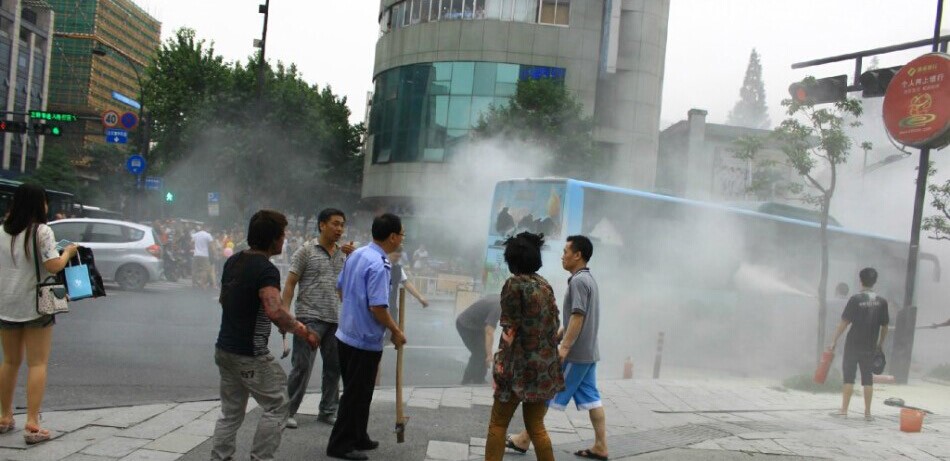Scholars advise multiple methods preventing public incidents

People helping with the passengers when the bus fire incident happened in Hangzhou
A bus fire left 32 injured in east China's Hangzhou, capital city of Zhejiang Province, during rush hours on July 7. The following morning, police said it was caused by an act of arson. In 2014, there have already been five accidents of bus fires caused by arson. The frequency of the violence has rattled the public and challenged social stability in China. As the nation modernizes, new factors affecting public safety are emerging, and the causes of incidents are becoming increasingly diversified.
'Demonstrative effect'
Zhang Mingjun, dean of the School of Political Studies and Public Management at East China University of Political Science and Law, said threats to public security can be divided into three categories by causes: direct interest conflicts, social anger and terror attacks. The incidents caused by social anger have increased in recent years.
"Incidents caused by social anger mostly target innocent people. These incidents are usually spontaneous and hard to prevent," Zhang said. "Social revenge incidents occur outside of the regular channels for a vent of grievance that are not acceptable by moral norms. They are very irrational."
"The increasing demonstrative effect of social revenge incidents cannot be ignored," said Lu Wengang, dean of the School of Administration and Emergency Management at Jinan University. In addition to "spontaneity" and "demonstrative effect," Du Haifeng, professor of public policy and management from Xi'an Jiaotong University indicated the Internet also plays a role. With the development of high technology, the channels for disseminating information have become much more diverse. Consequentially, these new forms of communication have also increased the potential for damage caused by rumors or any other false information, Du said.
Influenced by the spread of exaggerated information, subjective and derivative incidents have increased, making it much harder to handle issues in question. By delving into the underlying causes of incidents, we found there are more reasons beyond communication barriers and the unbalanced distribution of power and wealth, Lu Wengang added. Lu said that during the period of social transformation, the impact of increasingly diversified values and ways of thinking has also become significant. The plurality of values has undermined the existing norm system and caused "chaos," making some people uneasy and unable to adapt.
A 'firewall' relying on everyone's effort
As social scientists attempt to address the problem, they are finding it difficult to collect data and establish precise models to do research on public security incidents because they are "spontaneous," "unorganized" and "unpredictable," Du Haifeng said. Most research — both in theory and practice — is still at the preliminary stage. Du suggested conducting multidisciplinary research by integrating knowledge in social sciences and natural sciences. Changes in the social environment affect individual psychology.
Ma Ben, associate professor at Shangdong University, indicated that imbalanced psychology can cause irrational or even extreme behavior. Extreme behavior requires efficient management.
By applying the logic of "environment-psychology-behavior-management" into real-world situations in China based on the social-ecological system theory, social scientists should be able to design an evaluation system that includes indicators of environment, psychology, behavior and management, helping to reduce security incidents, Zhang proposed.
In addition, Zhang said, Chinese political culture has traditionally emphasized power while downplaying the rule of law. In order to change that, the nation must promote a modernization of political culture and encourage a shift in individual awareness from subjectivity to rationality.
Preventing public security incidents cannot be done on a case-by-case basis. The issue needs to be addressed comprehensively on the national level, some interviewees said. By investigating the root causes, we then are able to find an efficient solution that can prevent and contain incidents.
Building a "firewall" for public security relies on everyone’s efforts. Lu Wengang argued that public participation in the governance of public security has become an important necessity for emergency response during the process of modernization. The people are the first responders, so it is critical for them to be equipped with security awareness as well as knowledge of survival, self and mutual rescue, efficient prevention and emergency preparation.

 PRINT
PRINT CLOSE
CLOSE